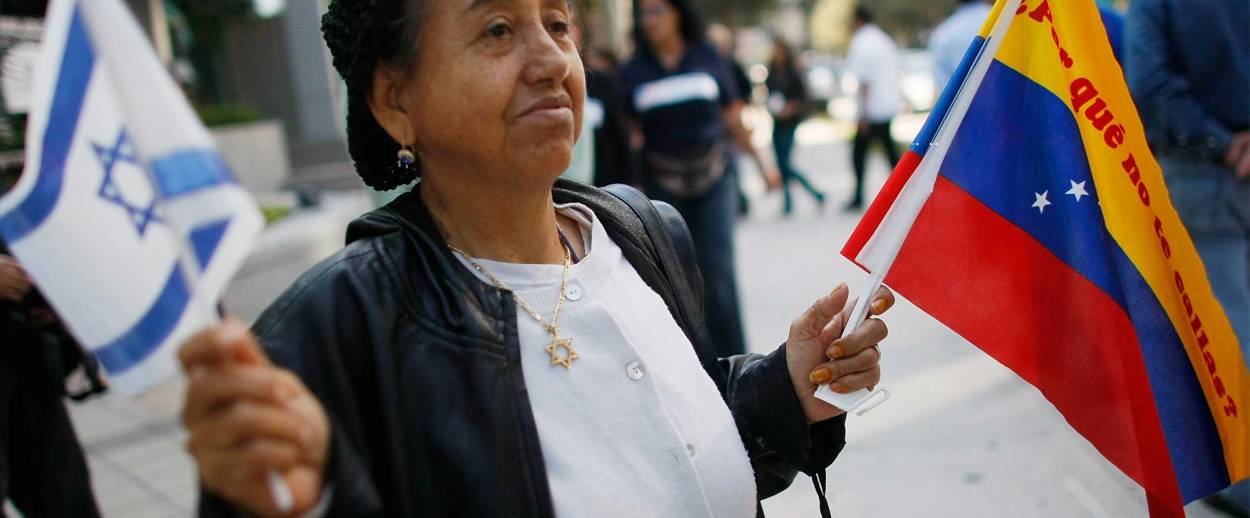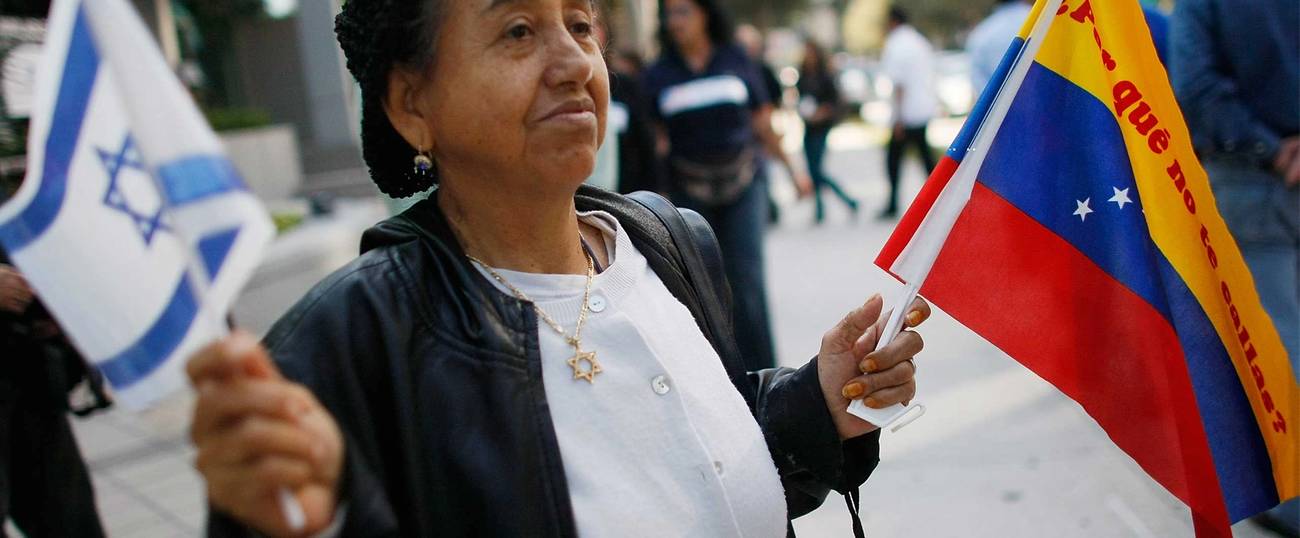Latino Jews Respond to Trump
Feelings of unease, and tiny pockets of satisfaction, around the results of the 2016 presidential election




“You are not Latina,” Tanya Saavedra’s stepfather once told her. “You are Jewish! You will never be able to get rid of that.” In this year’s presidential election, however, Saavedra, a communications specialist at a progressive think tank in DC, saw an opportunity for both her communities to be aligned. “Here was a presidential candidate that should’ve sounded just as horrible to Jews as he blatantly did to Latinos,” she recalled recently.
Since the election, however, she found herself in deeply combative arguments within her Jewish community about Trump not being “that bad”—including with her own stepfather. “He told me that he thinks my fighting for racial equality is a fake front,” Saavedra recalled. “That I pretend to fight for Latinos and other races.”
Saavedra’s stepfather, like many other American Jews, grapple with what it means to be Jewish in the racial and ethnic context against the backdrop of American race politics. And therein lies the perceived divide between Jews who feel a moral and historical responsibility to fight for justice and equality for all, Jews who feel neither connection to nor affinity with other races or oppressed communities around them, and Jews who value social justice yet treat it more as a “luxury,” a secondary “want” and not an essential “need.” As Saavedra clarified, “You have the Jews who see themselves as part of the fight, and those who see themselves as part of the mainstream. It’s intricately tied and tangled with issues of class and wealth, not just skin color. For those Jews who don’t think they’re any different from the mainstream, it will take major seismic activity to shake them.”
For Ruby Velez, a Puerto Rican-Dominican Jew, that moment came within 72 hours of the election, when she was told to go back to where she came from. “A total stranger popped up on my FB page and told me to leave ‘her’ country. Based on nothing else except my last name,” she said. Her first response was to laugh. After all, the bulk of her family arrived on the mainland from Puerto Rico in the late 1950s, and her Dominican relatives not 15 years after that. She stopped laughing because of her daughter.
During Martin Luther King Jr. weekend this year, Velez took her daughter to the Holocaust Memorial Museum in Washington. She felt it was important that her daughter place the stories that she’d heard in context of the larger horror. After the Hall of Shoes, Velez’s daughter fell apart in her arms. “I realize now,” Velez acknowledged, “that this was my daughter’s first real heartbreak—not being turned down on a date or rejected at a school dance, but humanity.” Velez held her daughter in her arms and promised her that she would be OK, because her existence was a blessing and a gift. The fact that this little mixed-race Jewish girl was in this place— alive, vibrant—was proof that we had won, that “Never Again” means something, that the fact that she was walking the Earth was a prayer and a blessing on behalf of those who no longer did.
And now, not even a year later, Velez’s daughter speaks in strong terms about defending her classmates who are even more vulnerable than she. She refuses to hide her Jewishness, her Latinidad, her queerness. She insists on living loudly, defiantly. She is who the Jews wished their neighbors were when they were in need. “My family has made a promise,” Velez affirmed. “To stand, to fight, to refuse to look away. To make it possible for other families, generations from now, to hold their children where I held mine. Even when we are scared. I am a Jew. I am a Latina. I will not debate this, for oppression is not debatable. And I will not be silenced.”
Joel Sanchez, a Mexican-American Jew born and raised on the South Side of Chicago, is a private-practice psychotherapist in Liberty, New York. He says he sees clients who are not all as resilient as Velez. “I have undocumented clients who are terrified,” Sanchez said. “I feel the fear and outrage growing, and a steady march toward increased oppression. I am old enough to have experienced the steady decline of this country, the gradual shift to the right, since the Reagan election in 1980. I guess I had hoped all this time that we wouldn’t get to this place.” Sanchez was shocked by Trump’s election; during Trump’s campaign, he decided that he, his wife, and their 4-year-old daughter would move to Mexico for a better quality of life.
In the meantime, over the next few months, Sanchez plans to work as hard as possible on steps that can still be taken in America, including information sessions for undocumented immigrants and other populations who are directly affected by this election. “The most important thing right now,” he counseled, “is resistance and avoiding normalization of what has happened.”
Annette Raij, a Mexican Jewish lawyer in Manhattan, remains incredulous at both the Mexican and Jewish turnout for Trump, and wary about what Steve Bannon’s appointment as the president-elect’s chief strategist means for the future of her country. “I’m Mexican and my husband is Cuban, and we have two little ‘Jubicans,’ ” she explained, using a term for Mexican-Cuban Jews. “I’m terrified for our future and am scared to travel without my passport ID for fear that I can get profiled and be caught without proof of citizenship.”
Fear, however, is not on the menu for community organizer Kat Macías, a queer Puerto Rican-Cuban Jew from Boston. “I am not afraid,” Macías said. “When I was a teenager I decided that I never wanted to live in fear. But that doesn’t mean I’m not scared.” But Macías is definitely worried. Worried about her white Ashkenazi community of friends and the rise in anti-Semitism in Boston. Worried that so many people are stuck in their fear, unable to do much but express worry and concern over the future. Worried that she hasn’t seen a cohesive collaboration among the minority groups targeted by the president-elect’s vitriolic campaign.
In the wake of such uncertainty, Macías believes that now is the time for marginalized groups to reach outside their bubbles and toward each other, because it is in those groups that resistance and safety can be found. “More than anything, I want to see diverse gatherings of people sharing meals and stories, and really building relationships. I want to see Jews greeting Muslims on their way to Friday prayers. I want to see queer organizations and disability-justice organizations planning events together. I want to see white women putting in time with organizations supporting our undocumented siblings. I want to see all of us remembering that we share stolen land, and our indigenous siblings are trying to remind us to protect water. We need each other more now than ever.”
For others, this election has peeled back the veil to reveal not only the ugly nature of the country, but the ugliness in their own communities. “I was invited out for lunch the first Shabbos after the election and didn’t want to go,” writer, speaker and Dominican Jew Aliza Hausman said. “From what I had read of other Jews, mainly Orthodox Jews, writing online, I didn’t feel like it was safe to go outside. I can’t count how many times I’ve heard other people, other Orthodox Jews, after the election say ‘We don’t have to be PC anymore! We won! Being PC is dead.’ ”
A first-generation Dominican-American Latina whose parents were brought to the United States as children, Hausman doesn’t look like the typical Latino in Los Angeles. She “passes” and therefore experiences the dubious privilege of her fellow Jews talking in front of her about “those Mexicans.” Hausman specifically remembers one woman telling her she was paying her underage, undocumented Latina nanny $4 an hour.
Hausman’s family came to the United States legally, but at a great cost to the rest of her family. It took five years for her maternal grandmother to be able to bring Hausman’s mother and sister over. Hausman’s paternal grandmother had to leave behind all her “adult” children, who were barely out of their teens, forever fracturing their family. Hausman can intimately understand why people come illegally to the United States rather than be separated from their families for years, if not permanently.
Aharon Pinchas Gavrielov, a Panamanian-American consumer lender, doesn’t quite see Trump’s victory as a red flag. Despite the intersection between the 24 percent of Jews who voted for Trump and the 29 percent of Latinos who did as well, Gavrielov acknowledges that his viewpoint is unpopular among both co-religionists and his ethnic community. “Maybe I don’t agree with Trump’s opinion on immigration from Latin America, but I voted for Trump for the overall picture,” he said. While Gavrielov admitted he “doesn’t know enough” about Trump’s stance supporting the reinstatement of the controversial—and unconstitutional—policing policy known as “stop and frisk,” he admired Trump’s lack of fidelity to any political party. “We, as a nation, complain that our politicians are screwing us over and raping us dry, and yet we keep electing them. That’s why I voted for Donald Trump.”
***
You can help support Tablet’s unique brand of Jewish journalism. Click here to donate today.
MaNishtana is the pseudonym of Shais Rishon, an Orthodox African-American Jewish writer, speaker, rabbi, and author of Thoughts From A Unicorn. His latest book is Ariel Samson, Freelance Rabbi.